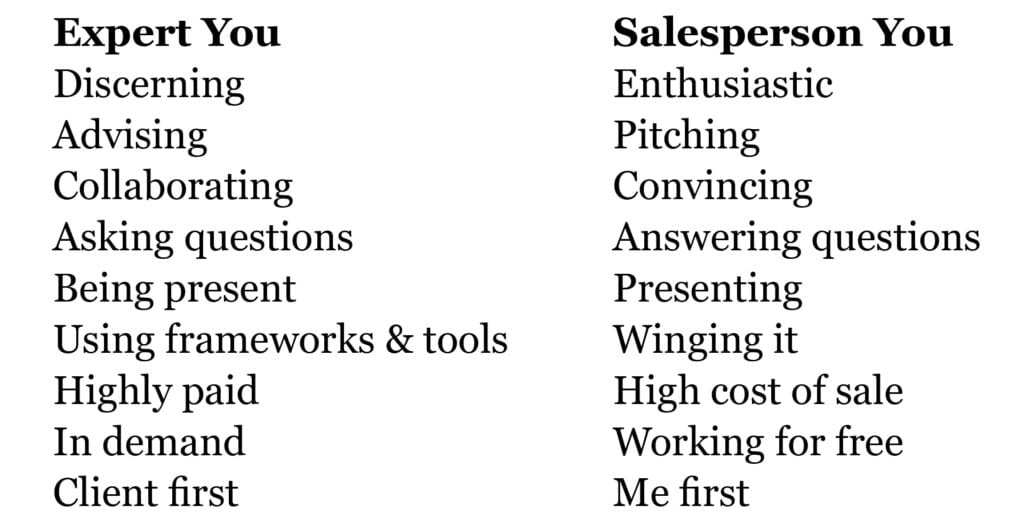I love a double entendre. Pricing Creativity—assigning prices to your creative outputs, but also bringing some creative thinking to your pricing decisions.
Selling Expertise was long the working title of my next book (out in September) before I changed it to…something I’ll tell you at you launch.😜
“Selling Expertise” refers to the selling of expert advisory or practitioner skills, and also building expertise in the domain of sales. When I say “the expert salesperson” I mean an expert (advisor or practitioner of some kind) who also sells, and who performs both roles at a high level. After having worked with thousands of experts across various fields of creative, consulting, finance and other domains, I am struck by how few people do both well. The problem, I believe, is all the old clichés of what it means to sell.
Let’s explore both sides of the expert salesperson.
Expert You
Your first job is being an expert at something. You’re a creative or a marketer or a consultant or an advisor. You have domain expertise and possess the natural confidence that arises from it. You know how an expert should behave and you show up in your engagements this way. As the expert your job is to advise, to counsel and maybe to execute with skill. Your clients expect you to guide them, to lead. Depending on what you do, they put their most precious assets—careers, businesses, financial security, health, loved ones—in your hands. They trust you and you rise to that trust. In the engagement you are the best version of your professional self.
Salesperson You
Your second job is selling that expertise. You don’t enjoy it as much and you don’t bring the same confidence. There seems to be a separate sales playbook that is at odds with how an expert behaves. Your discomfort with this clash of behaviors shows up in the results. The numbers don’t lie: you don’t love selling.
In the sale you feel a lesser version of your professional self. You think you have to pursue, to convince, to pitch. You search for scripts, hoping to learn exactly what to say. You seek to improve your presentation skills and you build larger, more elaborate pitch decks. Even if you’ve never been trained to do any of these things you intuit them. Salespeople behave a certain way. They prefer answers to questions. They present instead of converse. They bring urgency, leverage scarcity and make their pitch.
The conflict between expert you and salesperson you is rooted in your mistaken belief that the latter needs to be different from the former.
Selling expertise is not the same as selling products or transactional services. Playbooks for selling timeshares do not readily translate to selling ideas or advice. In any engagement of expertise there is a relationship that follows, and the dynamics of that relationship are established in the sale itself. Sell like a needy vendor and you will be relegated to vendor status in the engagement, robbed of your ability to do your best work and to command your highest fees. Sell like the expert you are and the client will try on what it will be like to work with you. You will claim the high ground of the expert and you will spare both of you the embarrassing sales clichés.
There is no need for the slick salesperson. The ideal salesperson version of you is the expert version of you—you in the engagement, leading the client, you at your best. That person can become an excellent salesperson. They can enjoy better closing ratios, higher fees and maybe even fall in love with selling.
Okay, So How?
Look at the conflicting attributes of expert you and salesperson you below. Clearly salesperson you is a horrible advertisement for expert you. No wonder you don’t enjoy selling.
It doesn’t have to be this hard. Strike every attribute under salesperson you and copy and paste the attributes under expert you. This is how you should show up in the sale.
The world needs more of expert you.

